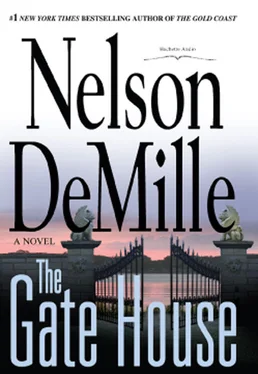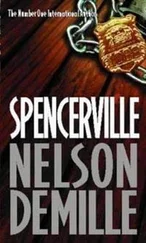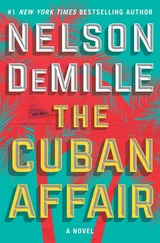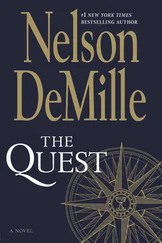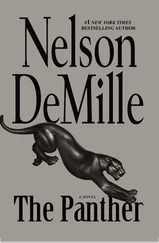“I can pick you up.”
“I’ll meet you there.”
“Okay. It’ll just be us.” Anthony reminded me, “You don’t want to mention the time and place to anybody.”
I looked at him, and our eyes met. I nodded, and he said, “Good.”
I started to open the door, but Anthony said, “Just a sec.” He pulled out his cell phone, speed-dialed, and said, “Yeah. Ready.” He hung up and asked me, “You want to come out and say hello to Tony?”
I wouldn’t have minded some fresh air, but as I learned at Giulio’s, it’s a good rule not to stand too close to anyone who needs a bodyguard, so I said, “Perhaps another time.”
He apparently needed a minute to be sure he wouldn’t be standing alone on a dark road, so to pass the time, he asked me, “How come you haven’t seen her?”
“I’m busy.”
“Yeah? Is she busy? She got a boyfriend?”
“I have no idea.”
He looked at me and surprised me with a deep philosophical insight by saying, “This is all pretty fucked up, isn’t it?”
I didn’t reply.
His cell phone rang, and he glanced at the display but did not answer. He said to me, “Thanks for your time.”
I opened the door and said, “Thank you for stopping by.”
He smiled and said, “Hey, you looked like you saw a ghost.”
“You have your father’s eyes.”
“Yeah?” He put out his hand, and we shook. He said, “See you Wednesday.”
He walked out into the chill air, and I watched him go through the small postern gate and out to the road where Tony stood beside a big black SUV of some sort. What happened to the Cadillacs? The SUV was running, but its headlights were off, and Tony had his left hand on the door handle and his right hand under his jacket.
Some of this was a little melodramatic, I thought, but you might as well follow the drill. You just never know. Then, I thought, maybe there’s an open contract out on Anthony Bellarosa. And I’m having dinner with this guy?
Before the boys completed the drill, I closed the door and went back into the dining room, where I poured myself a cup of cognac.
“Right. Pretty fucked up.”
The following day, I drove my Taurus along Skunks Misery Road, one of a number of roads around here with less than appealing names, which you’d think the residents or realtors might want to change – but these are historic names, some going back to the 1600s, plus people who are worth a zillion bucks wouldn’t care if their estate was on a road called Chicken Shit Lane. It actually adds to the charm.
The Gold Coast is a collection of colonial-era villages and hamlets on the North Shore of Long Island’s Nassau County, about twenty-five to thirty miles east of Manhattan. Some of these villages have quaint downtowns, and some, like Lattingtown, where Stanhope Hall is located, are exclusively residential, a quiltwork of grand estates, smaller estates with pretensions, and new McMansion subdivisions built on former estates.
In its day – between the Gilded Age and the Roaring Twenties, which ended on Black Tuesday, October 29, 1929 – the Gold Coast of Long Island held the largest concentration of power and wealth in the world. You couldn’t throw a stone without hitting a billionaire. Since then, the Depression, the war, income tax, and the spreading suburbs had delivered what should have been mortal blows to this Garden of Eden of old money, old families, and old customs; but it’s hung on, a shadow of its former self, though now, with all this new Wall Street wealth, I sense a resurrection of the form, though not the substance, of this vanished world.
The Village of Locust Valley is the quintessential Gold Coast village, and that was my destination. My modest goal was a sandwich; specifically, Black Forest ham with Muenster cheese and mustard on pumpernickel bread. I’d been thinking about that for a week or so, and now the time had come. This sandwich could be obtained at Rolf’s German Delicatessen, which I hoped had not succumbed to gentrification, food fads, or healthy eating habits.
It was a perfect June day, mid-seventies, mostly sunny with a few fair-weather clouds in a light blue sky. The flowers were in bloom, and the big old trees were fully leafed and fluttering in a soft breeze. Outside the car, the birds were singing and bees were pollinating exquisite flowers while butterflies alighted on the little pug noses of perfect children, causing them to giggle to their nannies, “Oh, Maria, isn’t it wonderful to be rich?”
Being back here had sharpened my memories of why I was still teed off after a decade. I mean, I’d gotten on with my life, and my three-year sail, complete with a few life-threatening episodes, had been sufficiently cathartic and distracting so that I didn’t dwell on the past. And the seven years in London never seemed like an exile, or a place where I’d gone to escape the past. But now that I’ve returned, I feel that the past has been waiting patiently for me.
On a more positive note, most of these familiar sights brought back some good memories. I mean, I was born here, and grew up here, and got married and raised children here, and I still had family and friends here. And then I left. Maybe that’s why I’m still angry; it shouldn’t have turned out this way – and wouldn’t have if Frank Bellarosa hadn’t been screwing my wife, or vice versa.
I continued my drive down memory lane, which was now called Horse Hollow Road, and passed my former country club, The Creek. This brought back a lot of memories, too, such as the time Susan and I took don Bellarosa and his gaudily dressed wife, Anna, to the club for dinner. The members were not pleased, and looking back on it, I was not displaying good judgment. But it was pretty funny.
Anyway, it was Tuesday, near noon, and the day after Anthony Bellarosa had dropped by for what I knew had been an exploratory visit. I couldn’t believe I’d actually made a dinner date with this guy. As one of my own paesanos once said, “If you are going to sup with the devil, bring a long spoon.” Or, in this case, long chopsticks. Better yet, cancel that dinner.
This was my first trip to the village since I’d returned, and as I approached I noted the familiar landmarks. This area was settled in 1667 by the English, including my ancestors, and the residents have been resisting change ever since, so there wasn’t too much new in the quaint hamlet. It’s all about the zoning.
I turned onto Birch Hill Road, the old main street, and cruised through Station Plaza, where I used to take the Long Island Railroad for my fifty-minute commute into Manhattan. In the plaza was McGlade’s Pub, where Susan would sometimes meet me when I got off the train. Thinking back, I now wondered how many times she’d had afternoon sex with Frank Bellarosa before having drinks with me.
I slowed down as I approached my former law offices, where I used to put in a day or two each week to break up the commute into the city. The Locust Valley branch of Perkins, Perkins, Sutter and Reynolds had been housed in a Victorian mansion at the edge of town. The mansion was still there, and it was still a law office, but the ornate sign on the front lawn now read: joseph p. bitet amp; justin w. green, attorneys-at-law.
I didn’t recognize those names, and not seeing my name on the sign was a bit of a shock, though it shouldn’t have been.
If this was a Twilight Zone episode, I’d now enter the building and see that the furniture was different, and I’d say to the receptionist, “Where’s Kathy?” and the lady would look at me, puzzled, and reply, “Who?”
“My receptionist.”
“Sir? How can I help you?”
“I’m John Sutter. This is my office. Why is my name not on the sign?”
Читать дальше
